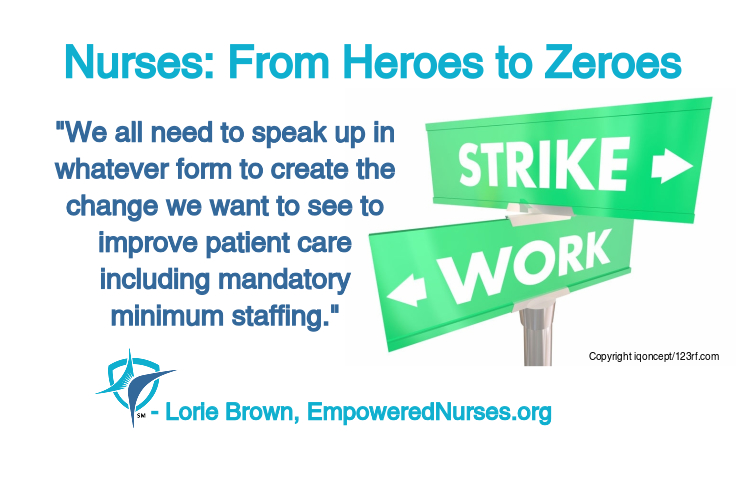Nurses: From Heroes To Zeroes

When COVID-19 first erupted, nurses showed up to the University of Illinois Chicago Hospital to care for affected members of the community in their great time of need. The nurses risked their lives and those of their families to be at their job while the rest of us were in lock down.
A week ago, when the union contract at the Hospital ended and the parties were unable to agree on a new one, 1300 nurses were ready to walk off the job. But, citing patient safety concerns, a judge issued a temporary restraining order limiting the number of nurses who could physically strike. On Monday, September 14, 2020, in numbers that did not exceed the restraining order, the nurses did go on strike.
WOW! What an ethical dilemma! Can you imagine if you wanted to strike and were not allowed to, or nurses didn’t want to strike but were forced to go on strike? Either way, nurses would find themselves in an extremely difficult position.
At the time of this writing, the strike is in its fourth day without resolution as the nurses are negotiating for better pay, more PPE and increased staffing.
Not only is the nurse’s union on strike but also the Hospital Workers Union has walked out as well.
Even in inclement weather in Chicago during this time, nurses were walking the line to make their point that patients are in jeopardy with the inadequate staffing of the hospital. There are minimum staffing requirements for childcare and dog kennels. Certainly, there needs to be nurse-patient ratio requirement in health care.
California is the only state that nurse-patient ratios have been enacted and that is working well. However, I understand there were some unintended consequences with loss of support staff. This will need to be built into whatever agreements are reached.
The University of Illinois Chicago Health is importing nurses from COVID-19 “hot spots” to care for their patients. Again, this is a difficult situation for those imported nurses. Do they cross the strike line to care for patients and make a lot of money or stand in support of their fellow nurses and not cross the strike line?
It is unfortunate that after more than 20 negotiating sessions a settlement has not been reached. Nurses deserve to get top compensation. They deserve to come to work knowing that they can do their job without putting their patients in danger by ensuring adequate staffing.
The Reverend Jesse Jackson of the Rainbow Coalition joined in the striking nurses to march in support.
In a statement by Doris Carroll, the President of the Illinois Nurses’ Association, “Nurses who cross the picket line hurt the nurses who are fighting for better work conditions at the hospital. It’s always about staffing. Because nurses know what our patients need.
And when you tell me you do this because we couldn’t strike without you, strikebreakers, you are wrong. I have the Federal law on my side. I organize nurses to unite. Your desire to work at job actions destroy what we’ve built. A family of nurses united to stand for safer patient care, respect, and dignity.
You don’t know my nurses, our hospital, or our patients….
We are not your enemy. We are your sisters and brothers.”
There has not been a strike at the University of Illinois-Chicago for 40 years. This says a lot about this union and its effectiveness in negotiating. While I do not take a position on unions, I do feel that it is one way to advocate for change. Tolerating a situation as is, serves no one. We all need to speak up in whatever form to create the change we want to see to improve patient care including mandatory minimum staffing. There is a plethora of evidence based literature showing adequate staffing
- reduces medical errors and medication errors;
- decreases mortality;
- improves patient satisfaction;
- reduces nurse fatigue;
- decreases nurse burnout;
- improves nurse retention and job satisfaction.
It is unfortunate that, at this time, this matter has not been resolved.


